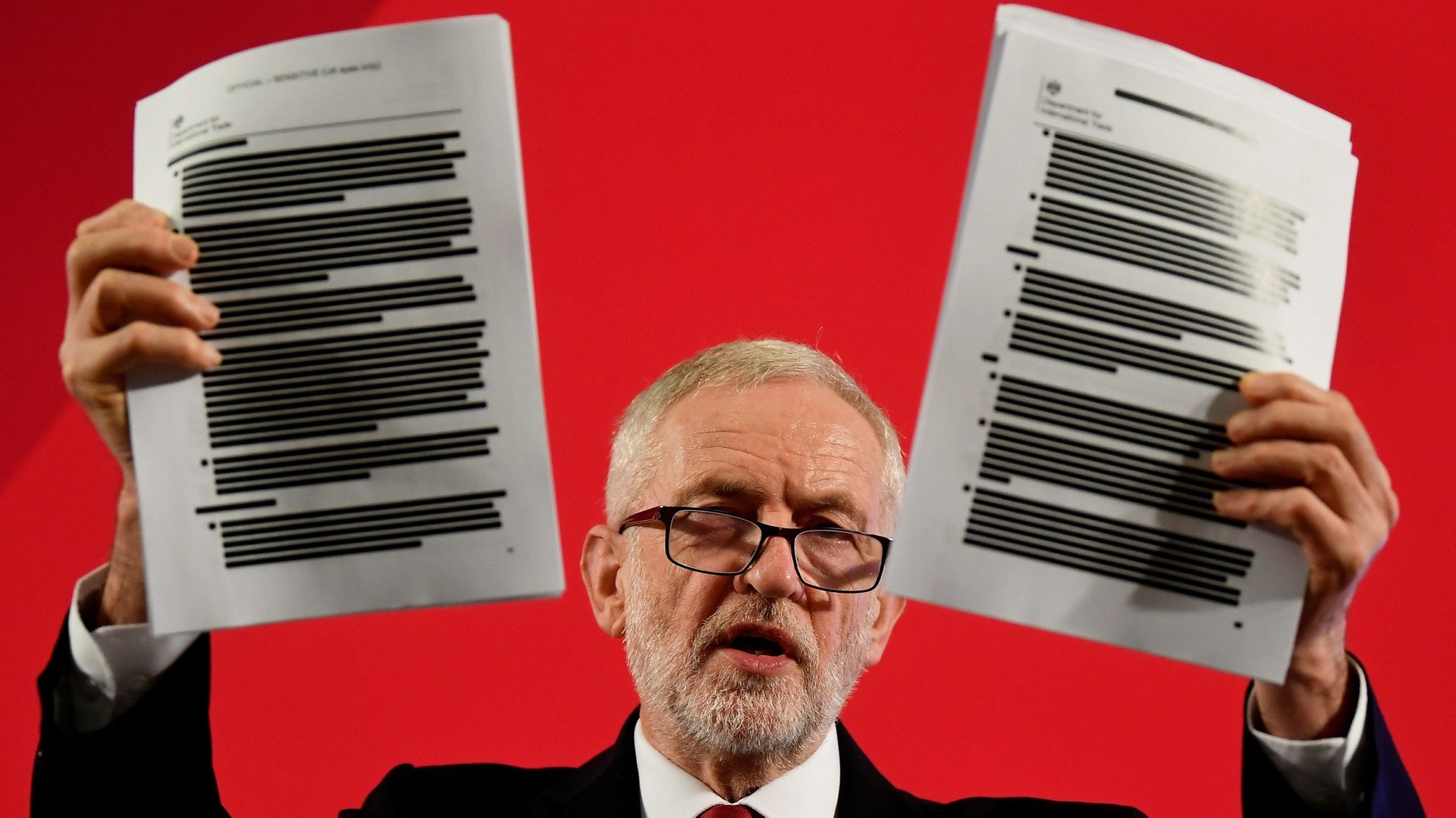The “NHS papers” cap off a complicated week for the Labour Party
During a much-anticipated news conference yesterday (Nov. 27), Labour leader Jeremy Corbyn dramatically revealed a stack of 451 uncensored pages of internal notes from the Department for International Trade. He said they showed that, between July 2017 and July 2019, senior UK and US officials discussed putting the National Health Service (NHS) “on the table” in a future post-Brexit trade deal. The claim countered repeated assertions by prime minister Boris Johnson and his Conservative Party that the NHS is off the table, no matter what.


During a much-anticipated news conference yesterday (Nov. 27), Labour leader Jeremy Corbyn dramatically revealed a stack of 451 uncensored pages of internal notes from the Department for International Trade. He said they showed that, between July 2017 and July 2019, senior UK and US officials discussed putting the National Health Service (NHS) “on the table” in a future post-Brexit trade deal. The claim countered repeated assertions by prime minister Boris Johnson and his Conservative Party that the NHS is off the table, no matter what.
The documents revealed that British and American officials had “preliminary discussions” on a future bilateral trade deal in which US negotiators showed interest in getting the UK to pay more for drugs produced by American pharmaceutical companies. They also appeared to test the waters on the NHS by asking whether the UK had any “concerns about their health insurance system.” UK officials were cautious. “Wouldn’t want to discuss particular health care entities at this time, you’ll be aware of certain statements saying we need to protect our needs; this would be something to discuss further down the line when we come to consider what entities would count as ‘enterprises.'” The British officials later concluded that “the query about ‘health insurance’ was likely a fishing expedition.”
So, did the Labour Party manage to persuade voters not to trust the Conservatives’ healthcare policies in the final stretch before the Dec. 12 general election? The NHS is enormously popular in Britain, and Corbyn’s big reveal was clearly meant to garner support from on-the-fence voters. And it may have also been a way to distract from a tough week for the Labour Party. On Monday, Britain’s chief rabbi said in a signed piece in The Times that Labour’s response to repeated accusations of antisemitism had been “utterly inadequate.” On Tuesday, Corbyn was criticized for failing to apologize to British Jews in a televised interview with the BBC’s Andrew Neil. On Wednesday, a new YouGov poll showed that the Conservative Party could win its biggest majority in parliament since 1987, although observers say a lot could change in the two weeks before election day.
But there is little to show so far that, by releasing the “NHS papers,” Labour has meaningfully shifted the conversation. As Channel 4 fact-checker Patrick Worrall explains:
“These are still preliminary talks, and there is nothing in these documents that suggests British negotiators have agreed to higher drug prices, or made any other concessions on the NHS. On the other hand, there is no evidence here of the British government having communicated to the Americans that they want to ring-fence the NHS and keep it out of any trade discussions.”
The documents describe conversations that took place before Boris Johnson became prime minister, and he has since vigorously denied Labour’s claims. But the papers do contradict statements made by Conservative politicians, including health minister Matt Hancock, that the NHS is “not up for discussion” at all in the talks. They also indicate that the US has a vested interest in changing the way the UK sets drug prices, which could cost the NHS billions of pounds a year.
As Worrall explains, “we learn something about what the Americans might want from the final negotiations, but we don’t know what the British government is prepared to concede.”
Labour is likely hoping that more voters will ask themselves the same question.